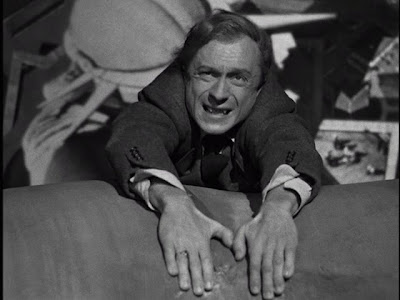Seeing such a rare thing as a "Brit noir" like They Made Me A Fugitive (1948) brings into relief what an American phenomenon classical film noir is. Perhaps it is because of its implicit denial of the American Dream. True, the British believe in "muddling through" and that "there'll always be an England." But there's no promise that you will be there to participate, or that you will come out all right. It's implied that in order for England to go on, you may have to take one for the team.
But the American Dream is an individual promise. Work hard, play by the rules, you will be taken care of. But that idea is on a collision course with the notion that Fate can always reach out, grab you, beat you to the pavement, and leave you there to face whatever comes. Non-Americans have always known this. The good thing about bad luck is that could always be worse. Maybe, perversely, that's why the happy ending of They Made Me A Fugitive is acceptable. Because in that culture, it's understood that all the endings are arbitrary.
Night and the City (1952) proves that it was possible to make an American film noir in Britain, simply substituting British actors, but maintaining the American outlook, style and pace. But They Made Me A Fugitive is thoroughly British, as demonstrated in both the black humor of the clip posted above and the class distinctions that riddle the story. Trevor Howard's character, Clem, is a "toff", a "swell." He is of better birth and background than his criminal pals, just slumming, in it for the money and likely to get out. That is intolerable to Narcy, the leader of the gang. The ironic thing is that Narcy is far more effete and fashionable than the rather gruff Clem. Trevor Howard was rather good at playing a man who, cultivated though he may be, is not to be trifled with. When people get hit in this movie, unlike those clean American fistfights--a swift "biff" to the chin and the fellow obligingly falls down--it's messy and people get hurt. There is a pervasive feel of danger, too--one senses that anything could happen, and that no character, even the comic relief, is safe.
The black humor mentioned above is also evidenced by a scene in which a woman harboring the fugitive Clem tries to entice him into doing her a favor by killing her husband. The humor and the rather good tough banter is attributable to screenwriter Noel Langley, best known for the basic script for The Wizard of Oz and the final scripts for the 1951 Alistair Sim version of A Christmas Carol and Pickwick Papers, directed, like Fugitive, by Alberto Cavalcanti. Perhaps that's what leavens this surprisingly tough film, given the way we Americans think of the Brits.
Afternoon tea in this movie would have to be laced with whisky. Or poison.





No comments:
Post a Comment